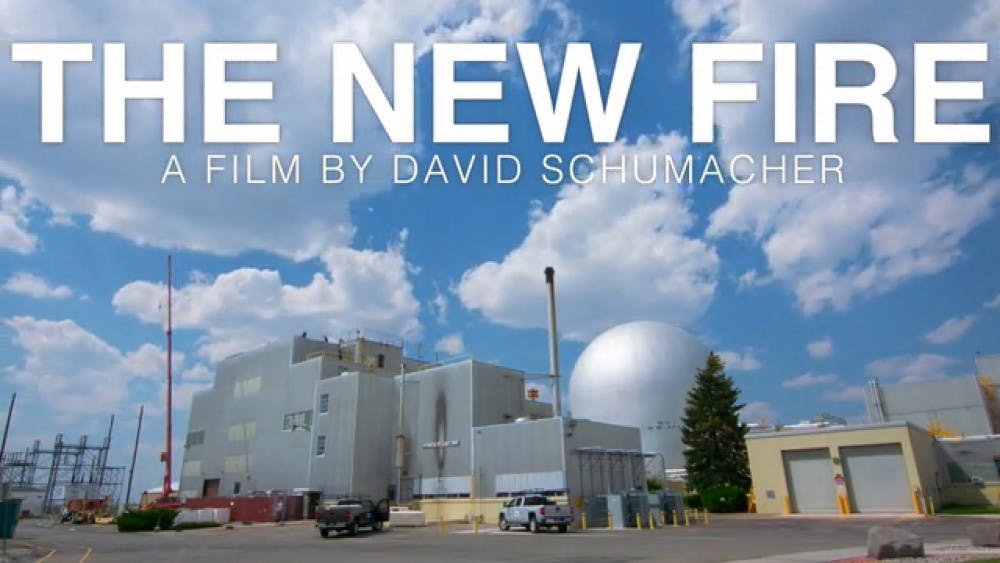Some documentaries are propelled by their subject matter, relying on the intrigue and drama of their subject to propel the film forward and to keep the audience’s interest. Other documentaries are driven by the filmmaking artistry of the director. Davis Schumacher’s The New Fire, which had its world premiere at Heartland Film Festival 2017, is a prime example of the latter.
Differing from other environmentally focused documentaries which often focus on the doom and gloom of Earth’s future, The New Fire is as optimistic as its title suggests. There is a new fire ready to light the way forward in the United States, and that fire is engineered by bright millennials and fueled by nuclear fission.
The film does a fantastic job explaining complex topics to the audience without ever condescending. The complexities of engineering challenges faced by nuclear physicists is laid bare in simplistic explanations and beautifully rendered animated segments that illustrate how the various designs for different reactors work.
As the filmmakers acknowledged both in the film and in the after-film Q&A session, nuclear power is a hard sell to most people who grew up in the Cold War era. This is one of the biggest issues facing the nuclear energy movement. The New Fire does an amazing job at convincing its audience of its pro-nuclear power arguments.
This is accomplished through the multitude of interviews with world renowned nuclear physicists and climate scientists. Some of the universities represented by their scientists include MIT, UC Berkley and Columbia University. Footage is even taken from the Paris Climate Talks of 2015 of top climate scientists conceding that nuclear energy must be embraced to achieve a carbon neutral energy infrastructure throughout the world.
The film follows a few startups that are focused on bringing about a nuclear revolution in the United States: Transatomic Power, TerraPower and Oklo.
Transatomic Power and Oklo are the product of enterprising, young nuclear engineers. Terrapower is a bit different, but it illustrates the legitimacy of the pursuit of a nuclear power solution (as if several scientists holding doctorates in nuclear energy isn’t enough). The Chairman of the Board of Terrapower is none other than Bill Gates, a man not widely known for making poor financial decisions.
The film does not get bogged down in the processes of making energy or with the struggles of engineering; the film’s audience is the everyman, not nuclear scientists. The film mostly focuses on how ill equipped the US government is at addressing the energy needs of an increasingly carbon conscious world and how to change that.
Another element that stands in stark relief to the average climate or energy focused documentary is the emphasis put on the opportunities that lay in the nuclear field. This optimism that practically oozes through portions of the film never seems misplaced or naïve; there are real opportunities to be seized in this sector of the energy market that has been practically abandoned since the late 1980s. The worldwide market for nuclear power is changing, and the film expertly shows how embracing nuclear could propel the United States to the forefront of the world’s emerging nuclear energy economy.
Opportunity is not the only area of nuclear power explored in The New Fire. There are many challenges to overcome in the nuclear field, public relations notwithstanding. Much of the legislative structure surrounding nuclear reactors and their regulations are centered around decade old models. This creates a problem for engineers not working with water-cooled reactor structures. There are also issues with funding. As one MIT professor says, “A nuclear reactor is not an app; this is not the kind of idea that can be fueled on pizza and lines of code. The risk is proportional to the reward, and this is about as big as it gets.”
In addition to the fantastic graphics, the simple explanations from dramatically overqualified people and inspiring tone, one of the biggest surprises of the documentary is the sudden musical number rendered by Eric Myer, an opera-singing nuclear power activist. During the segment covering the Paris Climate Accord, two activists hand out their pro-nuclear book to anti-nuclear activists, and an impromptu performance is given on a train. After the film, Meyers revealed that he had originally studied to be an opera singer, later deciding to move to the less crowded job market of the opera-singing nuclear activist. Now in addition to using his musical talents, he also runs a nuclear power advocacy group, Generation Atomic.
The film does not completely dismiss renewable forms of energy just because the subjects of the film have devoted their lives to nuclear power. Wind and solar power are discussed as being limited in feasibility, but instances of renewables doing good for energy infrastructure are shown as well. The films spends time in Gabar, Senegal, showing how even something as small as a row of solar panels can help people in energy deficient communities. The message of the filmmakers and of the multitude of scientists featured is not that nuclear should be the only way people generate power but that nuclear should be the main way for people to generate power.
In addition to opera singers, filmmakers, and nuclear physicists, Suzanne Jaworski, the chief of staff of the Office of Nuclear Energy for the Department of Energy shared the current administration’s stance on coal and nuclear power. She claimed that both President Trump and Energy Secretary Perry were open to the idea of expanding the US’ nuclear power capabilities.
Donald Trump and Rick Perry aren’t the only politicians warming up to the idea of a nuclear-powered future. In the year that had passed between the filming and the premiere, other government officials have started to pave the way for now legislation to help reignite the new wave of nuclear innovation in the United States.

Image: Kickstarter
For more entertainment related content, visit us at Byte Bsu!

















